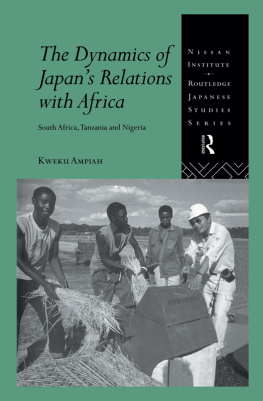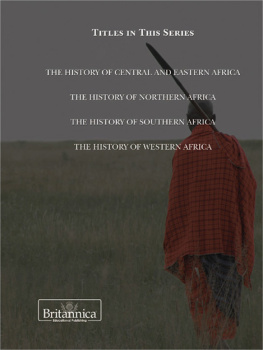The Dynamics of Japans Relations with Africa
The Nissan Institute/Routledge Japanese Studies Series
Editorial Board
J.A.A. Stockwin, Nissan Professor of Modern Japanese Studies, University of Oxford and Director, Nissan Institute of Japanese Studies
Teigo Yoshida, formerly Professor of the University of Tokyo, and now Professor, Obirin University, Tokyo
Frank Langdon, Professor, Institute of International Relations, University of British Columbia, Canada
Alan Rix, Professor of Japanese, The University of Queensland
Junji Banno, Institute of Social Science, University of Tokyo
Leonard Schoppa, University of Virginia
Other titles in the series:
The Myth of Japanese Uniqueness,Peter Dale
The Emperors Adviser: Saionji Kinmochi and Pre-war Japanese Politics,Lesley Connors
A History of Japanese Economic Thought,Tessa Morris-Suzuki
The Establishment of the Japanese Constitutional System,Junji Banno, translated by J.A.A. Stockwin
Industrial Relations in Japan: the Peripheral Workforce,Norma Chalmers
Banking Policy in Japan: American Efforts at Reform During the Occupation,William M. Tsutsui
Education Reform in Japan,Leonard Schoppa
How the Japanese Learn to Work,Ronald P. Dore and Mari Sako
Japanese Economic Development: Theory and Practice,Penelope Francks
Japan and Protection: The Growth of Protectionist Sentiment and the Japanese Response,Syed Javed Maswood
The Soil, by Nagatsuka Takashi: a Portrait of Rural Life in Meiji Japan,translated and with an introduction by Ann Waswo
Biotechnology in Japan,Malcolm Brock
Britains Educational Reform: a Comparison with Japan,Mike Howarth
Language and the Modern State: the Reform of Written Japanese,Nanette Twine
Industrial Harmony in Modern Japan: the Invention of a Tradition,W. Dean Kinzley
Japanese Science Fiction: a View of a Changing Society,Robert Matthew
The Japanese Numbers Game: the Use and Understanding of Numbers in Modern Japan,Thomas Crump
Ideology and Practice in Modern Japan,Roger Goodman and Kirsten Refsing
Technology and Industrial Development in pre-War Japan,Yukiko Fukasaku
Japans Early Parliaments 18901905,Andrew Fraser, RHP. Mason and Philip Mitchell
Japans Foreign Aid Challenge,Alan Rix
Emperor Hirohito and Showa Japan,Stephen S. Large
Japan: Beyond the End of History,David Williams
Ceremony and Ritual in Japan: Religious Practices in an Industralized Society,Jan van Bremen and D.P. Martinez
Understanding Japanese Society: Second Edition,Joy Hendry
The Fantastic in Modern Japanese Literature: The Subversion of Modernity,Susan J. Napier
Militarization and Demilitarization in Contemporary Japan,Glenn D. Hook
Growing a Japanese Science City: Communication in Scientific Research,James W. Dearing
Democracy in Post-war Japan,Rikki Kersten
Womens Giday and the Japanese Theatre Tradition,A. Kimi Coaldrake
The Right to Life in Japan,Noel Williams
On the Margins of Japanese Society: Volunteers and the Welfare of the Urban Underclass,Carolyn S. Stevens
First published 1997
by Routledge
2 Park Square, Milton Park, Abingdon, Oxon, OX14 4RN
Simultaneously published in the USA and Canada
by Routledge
270 Madison Ave, New York NY 10016
Transferred to Digital Printing 2005
1997 Kweku Ampiah. The author has asserted his moral right.
All rights reserved. No part of this book may be reprinted or reproduced or utilized in any form or by any electronic, mechanical, or other means, now known or hereafter invented, including photocopying and recording, or in any information storage or retrieval system, without permission in writing from the publishers.
British Library Cataloguing in Publication Data
A catalogue record for this book is available from the British Library
Library of Congress Cataloging in Publication Data
A catalogue record for this book has been requested
ISBN 0415144833
Series Editors Preface
... we are a people whose glorious history will bear to be held up to the gaze of Western nations. We have learned a great many things from the West, but there are some instances of our having outstripped our tutors.
So wrote Count Okuma in Fifty Years of New Japan, published in 1910, some five years after Japan had emerged victorious in the Russo-Japanese war. Over the eighty-six years that have elapsed since those words were written, the history of Japans relations with the rest of the world has passed through phases more turbulent than Okuma could probably have imagined. The tragic and terrible history of the 1930s and 1940s gave way, however, to decades in which the Japanese forged an amazing (and often deserved) reputation for economic development and efficiency. The idea of the Japanese outstripping their tutors is no longer as exotic as it must have sounded to an English-speaking readership in 1910, but its content has been radically changed with the passage of time. At the same time, Japans performance and practice continues to attract withering skepticism from some Americans and others. In a recent message on the Internet, Chalmers Johnson attacks named Chrysanthemum Clubbers and writes that one of his interlocutors seems not to know that Japan has basked in the favorable and exceptional treatment of the United States from John Foster Dulless peace treaty to Mickey Kantors last minute dive last summer in the auto talks. How the Japanese seek to resolve the dilemma of how far they can preserve a distinctive Japanese identity and practice in an increasingly globalizing world is fascinating to watch.
The Nissan Institute/Routledge Japanese Studies Series is ten years old in 1996. The Series seeks to foster an informed and balanced, but not uncritical, understanding of Japan. One of its aims is to show the depth and variety of Japanese institutions, practices and ideas. Another is, by using comparison, to see what lessons, positive and negative, can be drawn for other countries. The tendency in commentary on Japan to resort to outdated, ill-informed or sensational stereotypes still remains, and needs to be combatted.
Relations between Japan and Africa have seldom attracted serious scholarly attention. Africa has never been a major focus of Japanese overseas development aid, investment or trade. Nevertheless, it would be quite incorrect to say that Japan totally ignores Africa, and this book by Dr Kweku Ampiah, a Ghanaian with extensive knowledge of Japan and an impressive command of Japanese, follows Japanese policy in Africa down some intriguing paths. Concentrating on Japans presence in Tanzania, Nigeria and South Africa, and on Japans voting record at the United Nations on issues relating to Africa, he has written a pioneering book on a set of relationships likely to be of increasing importance in world affairs.












